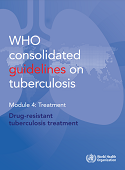WHO consolidated guidelines on tuberculosis: module 4: treatment: drug-resistant tuberculosis treatment (2020)

Download
The guidance provided in this module outlines specific WHO recommendations on the overall treatment management, care and monitoring of patients with MDR/RR-TB. It brings forward recommendations developed by various WHO-convened Guideline Development Groups (GDGs), using the Grading of Recommendations Assessment, Development and Evaluation (GRADE) approach to summarize the evidence, and formulate policy recommendations and accompanying remarks.
However, it also incorporates new recommendations that were made in November 2019, based on new evidence that was available to WHO on the following:
- shorter regimens for MDR/RR-TB;
- the use of the bedaquiline, pretomanid and linezolid (BPaL) regimen for patients with MDR/RR-TB and additional fluoroquinolone resistance;
- the use of bedaquiline beyond 6 months;
- the use of bedaquiline in pregnancy; and
- the use of bedaquiline and delamanid together.
In particular, this module focuses on public health recommendations on the use of effective treatment regimens for drug-resistant TB; specifically, regimens for isoniazid-resistant TB, all-oral shorter regimens for MDR/RR-TB, longer regimens for MDR/RR-TB, monitoring patient response to MDR/RR-TB treatment, starting antiretroviral therapy (ART) in patients on second-line anti-TB regimens, surgery for patients on MDR-TB treatment, and care and support measures for patients with MDR/RR-TB.
Additionally, in an effort to inform the global community of the major gaps and research areas to be addressed to help inform the development of evidence-based recommendations, this document outlines the research priorities that will help us generate knowledge on evidence-based and attainable standards of health.



